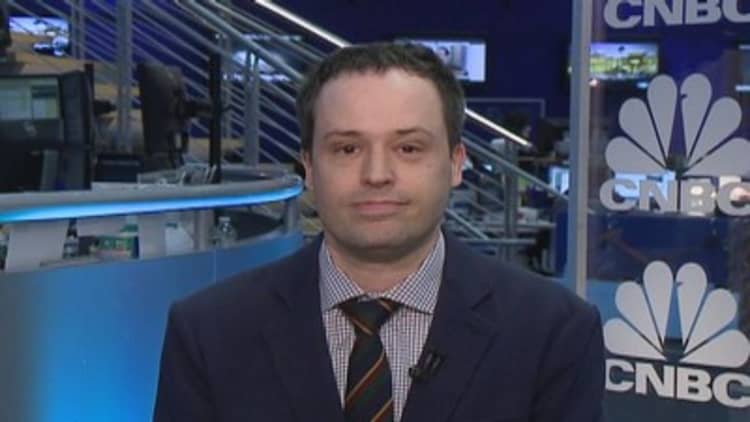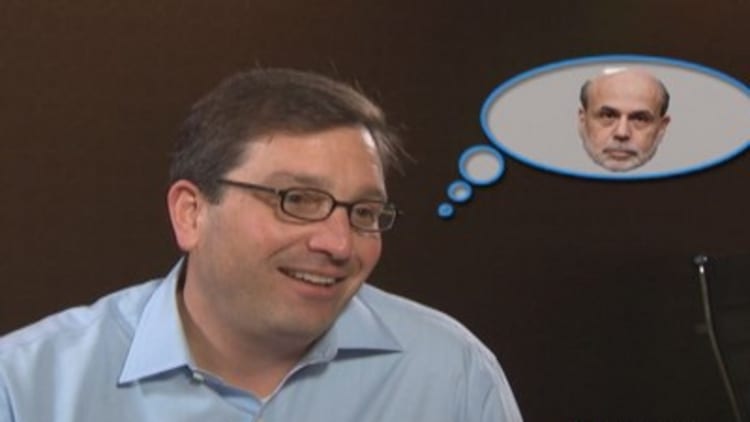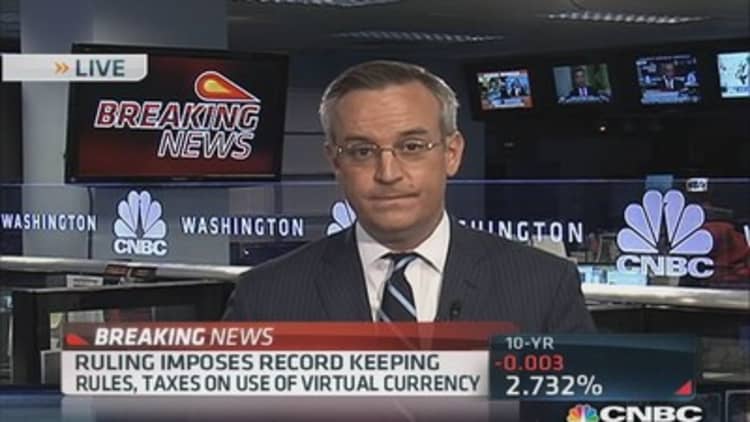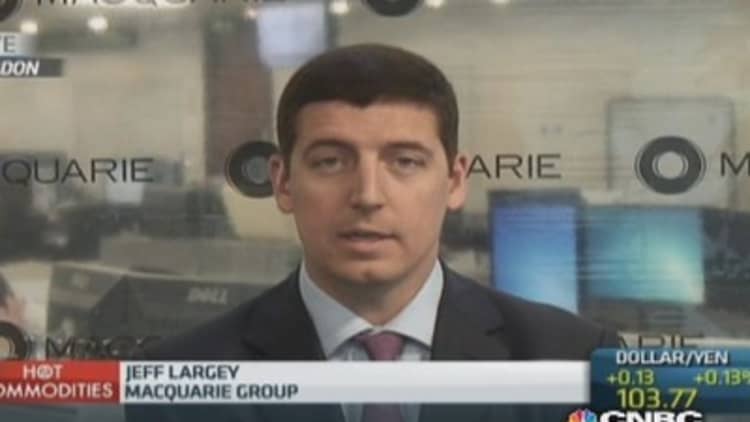In 25 years the U.S. dollar will probably still be the world's reserve currency, and bitcoin may not be around at all.
That's the consensus among a group of currency experts who spoke with CNBC about the future of money as part of the CNBC 25 special report. But even if the dollar retains its dominance and bitcoin fades away, that doesn't mean the state of money won't change a lot over the next quarter century.
'Gold and oil and guns'

The very volume of dollars in the world has given many people a conviction that the currency is worthless and doomed to lose its status as a global reserve currency. But if you want real insight into the dollar's status as a reserve currency, said ConvergEx chief market strategist Nicholas Colas, a good place to start is the $100 bill.
Many economists look at the hundred as a proxy for foreign demand for U.S. currency. Roughly 77 percent of the total $1.2 trillion in circulation in 2013 was denominated in $100 bills, according to Federal Reserve data. And most of those hundreds—about two-thirds of them, according to one Fed economist—are held outside the United States.
"And demand is increasing for hundreds," said Colas, who added that the dollar is likely to remain a global reserve currency as long as it's the way global markets price "gold and oil and guns." (Just like global markets for crude oil and gold, arms transactions of all sizes usually take place in dollars, largely because the United States makes more than two-thirds of those sales.)
In the end, money is anchored in trust, Colas noted, and no entity on Earth can match the U.S. track record for being good for its debt. The European central bank doesn't have a history nearly as long as the U.S. Federal Reserve, the euro zone entered a crisis in 2009 from which it still hasn't fully recovered, and the Chinese yuan is hobbled by tight—and completely nontransparent—government control.
The United States also tries harder than most nations to prevent counterfeiting, Colas said, pointing to $120 million the U.S. spent to redesign the new $100 bill last year.
Read MoreWill China use gold to internationalize the yuan?
"The $100 bill is the world's bitcoin," Colas said. "It's anonymous. It's easy to use. It's actually easier than bitcoin, because you don't need a computer or even power."
In short, the dollar is trusted for transactions domestic and international, legal and illegal. Colas described the ubiquity of the $100 by pointing to the five-inch aluminum Zero Halliburton briefcase, which has been made famous in film and TV as a secure money carrier. It was designed to carry 22 pounds of $100 notes, which neatly comes out to $1 million, Colas said.
Asked if the briefcase would accommodate $1 million in $100 bills, Zero Halliburton's vice president of operations and finance, Debbie Pawigon, told CNBC, "We're pretty sure that's true."
Bitcoin and digitization

Bitcoin, whose credibility took a hit with the spectacular collapse of its largest exchange, Mt.Gox, in February, may not dominate the world as a virtual currency in 25 years, but the idea of digitized money may. And the reason is as old as capitalism itself: lower costs.
"The really interesting story in money is its digitization, and the huge amount of friction that exists in the system, and the way that technology destroys all those costs," said Boris Schlossberg, managing director of FX Strategy at BK Asset Management.
From a purely technological perspective, the ability to pay anyone instantly in any currency exists already, with minimal or even no transaction costs. Banks are resistant to such a no-fee money marketplace, because they now profit by acting as intermediaries for transactions. In the coming years, however, "insurgents" will make those transactions easier and cheaper, Schlossberg said.
Read More
Facebook, for example, could facilitate user-to-user payments for less money than a bank charges, Schlossberg said. He spoke to CNBC four days before a report in the Financial Times said that Facebook plans to do that very thing by making it possible for people to send payments and store money via its social network.
A Facebook spokesperson whom CNBC asked about the report said that the company "declines to comment on rumors and speculation."
Schlossberg also pointed to Xoom, which lets consumers make payments internationally, and Square, which makes it possible to take payments through handheld devices, as other firms on the forefront of digitized transactions.
Bitcoin's value is as a medium of exchange, not as a currency per se, said Christopher Vecchio, currency analyst at DailyFX. In fact, most money today is already electronic form. "The bank isn't holding a lot of money in there. The money in your account is data," he said. "It's a set of zeros and ones."
Where consumers once wired money through Western Union for fee, they now pay a much smaller percentage-based fee through PayPal. The best thing about bitcoin, Vecchio said, is that it's basically free to use. Of course, so is cash.
"The future of money will really be on finding ways to transact in a lower-cost way, and that's a societal trend, not just bitcoin," Vecchio said.

When it comes to the dollar, the case for the status quo is stronger than the case against it, said Colas, but he acknowledged that the Federal Reserve has put the United States into uncharted territory. Quantitative easing represents an unprecedented level of monetary engagement by the Federal Reserve.
"It really is unique," said Colas, who called the results of QE so far positive, but modest. "We have a Federal Reserve with a balance sheet of $4.2 trillion. The number before the financial crisis was $800 billion."
Many economists—including Philadelphia Federal Reserve president Charles Plosser—worry about the Fed's central role in the economy. Many regular investors, especially fans of gold, think an overabundance of U.S. dollars in the world means that the currency will inevitably collapse. The more strident in the gold camp think the United States will go down with it.

But over the next 25 years, said DailyFX's Vecchio, the more likely scenario is that if the dollar declines as a global currency, it will do so because America's portion of the global economy declines, not the other way around.
"In terms of the dollar itself, people have been talking about the coming collapse of the dollar, but it's been losing value since 1980. It's hard to say that the dollar has been building up and is about to collapse," Vecchio said.
Read MoreThe difference between a 'bear market' and a 'correction'
According to the most recent Triennial Central Bank Survey from the Bank of International Settlements, the U.S. dollar was incorporated on one side or the other of 87 percent of global foreign exchange transactions in April 2013. That's an increase from 85 percent three years earlier.
Part of that increase can be accounted for by the decline of the euro during that period, Vecchio said. But regardless, the data indicates that the role of the dollar increased rather than decreased during the financial crisis. America's growing status as a global energy powerhouse further argues for a stronger U.S. economy—and strong U.S. dollar—in a quarter century.
"People have been saying the dollar is going to collapse for 20 years," Vecchio said. "But it's emotional rhetoric."





